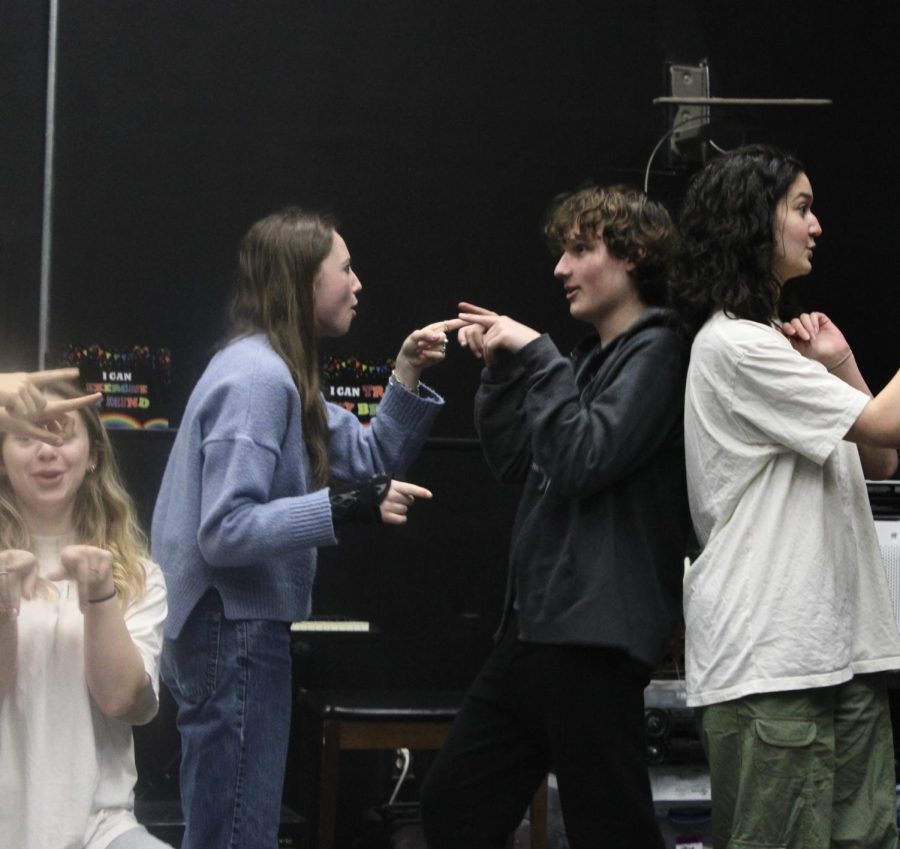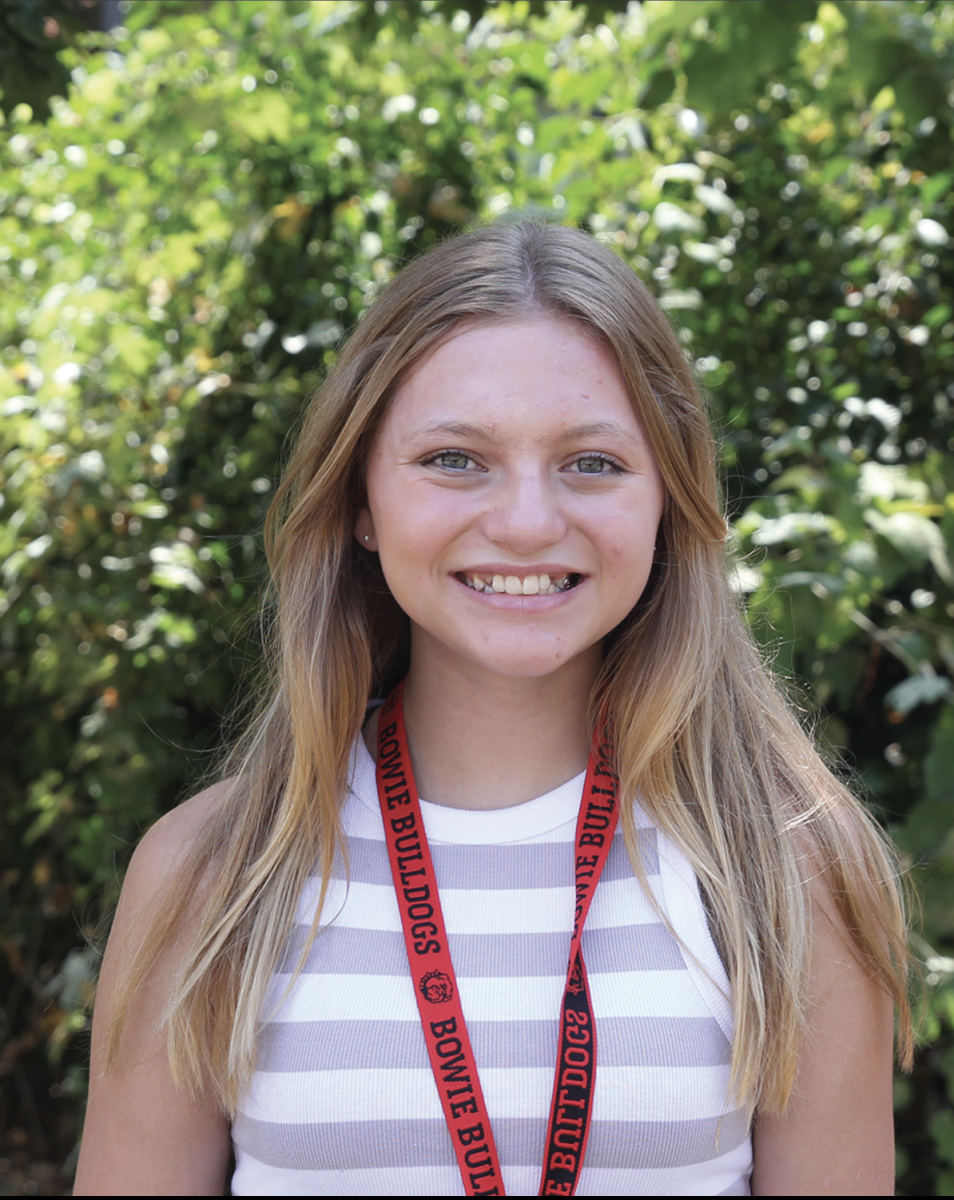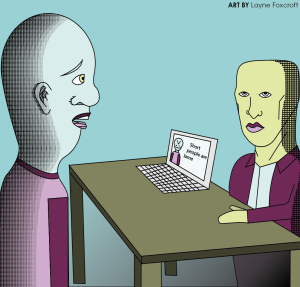Speech and debate students continue to excel in tournaments
PRACTICE MAKES PERFECT : Juniors Bella Barkkume and Jaden Demetri practice for their upcoming oral interpretation competition. Barkkume heads to the UT speech and debate camp this summer on a scholarship.
March 6, 2023
Lions, tigers, and state qualifiers! Oh my!
Bowie junior Bella Barkkume has qualified for oral interpretation state, nationals, and has been scouted by the University of Texas at Austin (UT) Speech team all in one tournament weekend. Barkkume’s qualifying piece, titled The Property Known as Garland, discusses the troubling life of Hollywood child star Judy Garland.
“The event I participated in at the [qualifying] tournament in January was Dramatic Interpretation (DI). It’s ten minutes long, so essentially a really long monologue,” Barkkume said. “My piece was on Judy Garland’s life and about how even today the media controls a female star’s success based on their appearance. This leads many young female celebrities to fall into addiction, alcoholism, and eating disorders (ED’s). Within our society we need to recognize that this problem has continued throughout history, and is prominent in our influencers even today.”
Students in the oral interpretation program at Bowie practice voice changes, physical blocking, memorization, and go through the process of trimming down a script of their choice. While performing their piece, each student has to act as every character in their ten minute script, similar to a one-man-play.
“There are five main events that Bowie students compete in at tournaments: Humorous interpretation (HI), Dramatic interpretation (DI), Program oral interpretation (POI), duet, and duo,” Barkkume said. “We select a movie, article, or show and trim down part of the script into ten minutes and write an intro. Picking the piece is probably the hardest part. After you have your script trimmed you want to focus on memorization, and then play around with what event it fits into.”
Barkkume was not the only Bowie student who earned the twelve points necessary to compete at state; more than 30 Bowie oral interpretation students will test their skills this March at the state tournament in Houston, Texas. Tournament preparations at Bowie have been long underway according to Oral interpretation captain, Nadia Petru.
“State preparation is different from a regular tournament because state preparation starts a lot earlier,” Petru said. “Interp is great because you can make a lot of choices on the spot, but you can’t do that without memorization. I want to have my piece fully memorized, so I can have fun when I perform. I’m also trying a lot of new things with my piece at local tournaments so that I don’t have to risk experimenting in the state tournament room.”
Oral interpretation tournament coordinator, Lucas Wilcox, and his duo partner, senior Sara Caballero, have also qualified for state. The pair have been competing at tournaments this year with their piece titled, Beetlejuice, featuring a segment of the script from the popular 80s film.
“Sara and I have decided we want to be really competitive with our piece this year. We want to go to the state finals; we want to win state,” Wilcox said. “So we are practicing a lot more and spending time together, and trying to figure out how we work together in that scene. We’re also constantly looking for ways we can elevate our piece, increase our humor, and just play it up.”
Similar to many extracurriculars, oral interpretation heightens skills that can be used outside of the classroom and tournament room. Bowie oral interpretation instructor Marco Bazan helps his students build skills that improve communication, leadership, and self confidence.
“We work on the strategic type of things that we have to do, such as reading, selecting, and trimming scripts,” Bazan said. “But I do think that the students are building a skill set that they are unaware of. They may not notice but we’re building up their leadership abilities and helping them discover their own voice.”
Tournaments are held weekly at local high schools and can last up to ten hours. The frequent competitions offer students numerous opportunities to switch up their pieces and try new events to determine what works best. The regular tournaments provide the team with more feedback from judges and peers. As the Bowie state qualifiers prepare for their largest competition yet, they are utilizing all suggestions to make their performance stronger.
“When you compete at local tournaments, judges get ballots to fill out. The judges give you notes on things that they’d like you to improve, parts that they thought you did very well, and parts they didn’t like,” Barkkume said. “ I definitely take those notes highly into consideration, and it helps me find little details that I can change. But judges will give irrelevant advice sometimes, so I really think that it’s important to take whatever suggestions resonate best with you and trust yourself.”
It is recommended for students to experiment outside of their comfort zone to discover what methods of performing work best for them individually. However, at times, experimenting outside of comfort zones doesn’t work well in a competitor’s favor.
“Just have fun with it. If you’re doing a piece that you hate because you think it’s going to do well, it’s not going to do well. You have to enjoy what you’re doing,” Wilcox said. “You know you worked incredibly hard on those pieces, and when you’re not doing as well as you want to, don’t let that discourage you. Let it drive you.”
Despite the competitive side to oral interpretation, tournaments open up many opportunities for contenders as well as help build connections within the speech community.
“It’s comforting to have a community where you know everyone and even though you’re competing against them, I’ve still made so many friends around the country because of these tournaments,” Barkkume said. “I think that it’s just really cool to have the opportunity to meet new people and see how talented they are and learn everything you can from them.”
For Barkkume specifically, oral interpretation has opened up doors larger than she could have hoped.
“Being on the UT speech team has been a goal of mine since the day that I joined oral interpretation, and I was scouted by them this last tournament,” Barkkume said. “I was offered a scholarship at the UT Speech and Debate camp this summer, and I’m really proud of myself for being able to do that. In addition to that I’m hoping to do well at state and then tackle nationals this summer in Phoenix, Arizona.”










